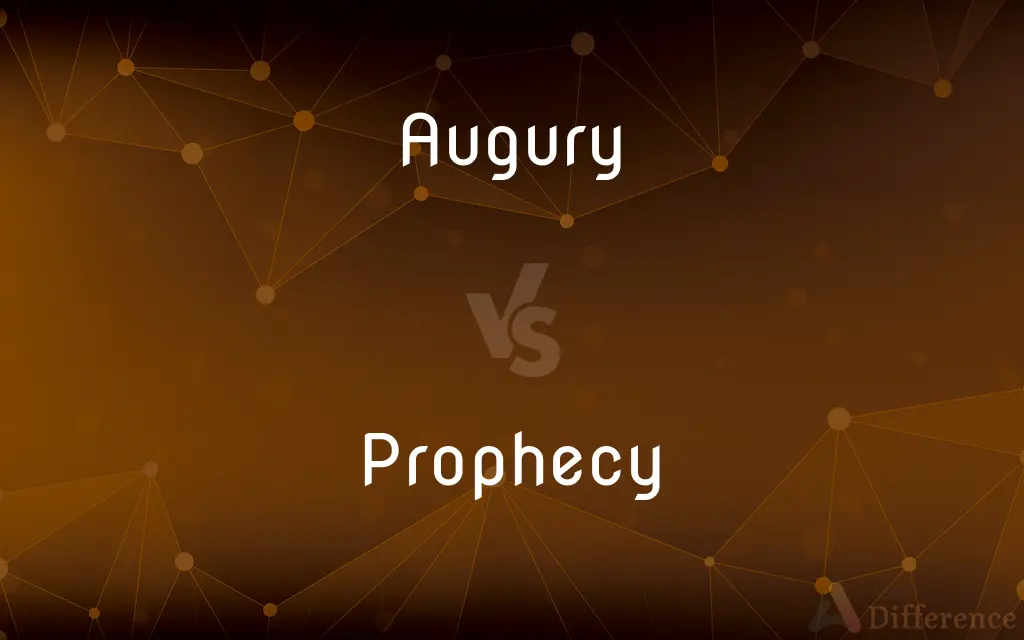Augury vs. Prophecy — What's the Difference?
By Urooj Arif & Fiza Rafique — Updated on April 7, 2024
Augury involves interpreting omens from the natural world, while prophecy is a divine revelation about the future.

Difference Between Augury and Prophecy
Table of Contents
ADVERTISEMENT
Key Differences
Augury, an ancient practice, involves observing and interpreting signs from the natural world, such as the flight patterns of birds or the entrails of sacrificed animals, to predict future events or understand divine will. On the other hand, prophecy refers to the act of receiving messages from a divine source, often concerning the future, and conveying them to others, typically through a prophet.
While augury relies heavily on specific rituals and the interpretation of omens within a cultural or religious context, prophecy is more about direct communication with a deity or spiritual realm, often involving visions, dreams, or spiritual inspiration. Augurs were specialists in their communities, respected for their ability to read signs from the gods, whereas prophets were individuals chosen by a deity to deliver messages, often bearing significant religious or moral implications.
The accuracy of augury is dependent on the skill and experience of the augur in interpreting signs, which can be highly subjective and vary across different cultures. Prophecy, however, is believed to be the direct word of a deity and thus holds a more absolute truth, although interpretations can still vary among followers.
In historical contexts, augury was a common practice in ancient Rome and Greece, deeply integrated into political and military decisions. Prophecy has played a central role in many world religions, including Christianity, Islam, and Judaism, influencing major historical events and cultural shifts.
Despite their differences, both augury and prophecy aim to bridge the human understanding of the present with the unknown future, offering guidance, warning, or insight into divine will. Their relevance and interpretation have evolved over time, reflecting changes in societal beliefs and values.
ADVERTISEMENT
Comparison Chart
Definition
Interpretation of omens from the natural world
Divine revelation about the future
Method
Observing and interpreting natural signs
Receiving messages from a divine source
Practitioners
Augurs
Prophets
Reliability
Subjective, based on interpretation skills
Considered absolute, though interpretations may vary
Cultural Role
Used for guidance in decisions, especially in ancient Rome and Greece
Central to many religions, guiding faith and morality
Compare with Definitions
Augury
Interpretation of Natural Omens.
Augurs interpret the flight of birds to predict future events.
Prophecy
Divine Revelation.
Prophets receive and convey messages about the future directly from the divine.
Augury
Ancient Practice.
Augury was widely practiced in ancient Rome for making political and military decisions.
Prophecy
Influential in History.
Prophecies have influenced decisions, movements, and cultural shifts throughout history.
Augury
Subjective Analysis.
The accuracy of augury relies on the augur's skill and experience.
Prophecy
Religious Significance.
Prophecy plays a key role in Christianity, Islam, and Judaism.
Augury
Ritualistic and Cultural.
Specific rituals and cultural understandings underpin the practice of augury.
Prophecy
Moral and Ethical Guidance.
Prophecies frequently contain moral or ethical instructions for followers.
Augury
Guidance for Decisions.
Leaders used augury to seek divine approval or guidance before actions.
Prophecy
Spiritual Inspiration.
Prophecies often come through visions, dreams, or an inner spiritual calling.
Augury
Augury is the practice from ancient Roman religion of interpreting omens from the observed behavior of birds. When the individual, known as the augur, interpreted these signs, it is referred to as "taking the auspices".
Prophecy
A prophecy is a message that is claimed by a prophet to have been communicated to them by a deity. Such messages typically involve inspiration, interpretation, or revelation of divine will concerning the prophet's social world and events to come (compare divine knowledge).
Augury
The art, ability, or practice of auguring; divination.
Prophecy
A prediction of what will happen in the future
A bleak prophecy of war and ruin
Augury
A sign of something coming; an omen
"The chartist buys when the auguries look favorable and sells on bad omens" (Burton G. Malkiel).
Prophecy
An inspired utterance of a prophet, viewed as a revelation of divine will.
Augury
A divination based on the appearance and behaviour of animals.
Prophecy
A prediction of the future, made under divine inspiration.
Augury
(by extension) An omen or prediction; a foreboding; a prophecy.
Prophecy
Such an inspired message or prediction transmitted orally or in writing.
Augury
An event that is experienced as indicating important things to come.
Prophecy
The vocation or condition of a prophet.
Augury
The art or practice of foretelling events by observing the actions of birds, etc.; divination.
Prophecy
A prediction.
Augury
An omen; prediction; prognostication; indication of the future; presage.
From their flight strange auguries she drew.
He resigned himself . . . with a docility that gave little augury of his future greatness.
Prophecy
A prediction, especially one made by a prophet or under divine inspiration.
French writer Nostradamus made a prophecy in his book.
Augury
A rite, ceremony, or observation of an augur.
Prophecy
The public interpretation of Scripture.
Augury
An event that is experienced as indicating important things to come;
He hoped it was an augury
It was a sign from God
Prophecy
A declaration of something to come; a foretelling; a prediction; esp., an inspired foretelling.
He hearkens after prophecies and dreams.
Prophecy came not in old time by the will of man.
Prophecy
A book of prophecies; a history; as, the prophecy of Ahijah.
Prophecy
Public interpretation of Scripture; preaching; exhortation or instruction.
Prophecy
Knowledge of the future (usually said to be obtained from a divine source)
Prophecy
A prediction uttered under divine inspiration
Common Curiosities
Can anyone become a prophet?
In many religious beliefs, prophets are chosen by a divine source, not by human decision or training.
What is augury?
Augury is the practice of interpreting omens from the natural world to predict future events or divine will.
Who practices augury?
Augurs, who are trained to observe and interpret specific omens, practice augury.
How does prophecy differ from augury?
Prophecy involves divine revelation about the future, often through a chosen individual, unlike the interpretation of natural signs in augury.
How did leaders use augury in ancient times?
Leaders used augury to seek divine guidance or approval before making significant decisions.
How are prophecies received?
Prophecies can be received through visions, dreams, spiritual inspiration, or direct communication with the divine.
Were augurs considered reliable?
The reliability of an augur was dependent on their skill and the cultural value placed on augury.
Did augury influence political decisions?
Yes, in ancient Rome and Greece, augury could significantly influence political and military decisions.
Is augury still practiced today?
While modern practices may differ, some cultures still observe rituals akin to ancient augury.
What is the significance of prophecy in religion?
Prophecy often serves to guide moral and ethical behaviors and to reveal divine plans or warnings.
How did augury and prophecy influence societies?
Both practices have shaped historical events, cultural norms, and religious beliefs by providing guidance or warning of future occurrences.
What impact did prophecy have on historical events?
Prophecies have led to the founding of religions, wars, and social movements, deeply influencing human history.
What is the role of a prophet?
A prophet acts as a messenger, conveying divine revelations to people, often with significant religious or cultural implications.
Are there modern equivalents to augurs and prophets?
While not identical, modern spiritual leaders or interpreters of religious texts can serve similar roles in providing guidance.
Can the accuracy of a prophecy be questioned?
While considered divine, the interpretation of prophecies can vary and be subject to debate among followers.
Share Your Discovery

Previous Comparison
Aftermarket vs. Aftersales
Next Comparison
Spanking vs. WhoopingAuthor Spotlight
Written by
Urooj ArifUrooj is a skilled content writer at Ask Difference, known for her exceptional ability to simplify complex topics into engaging and informative content. With a passion for research and a flair for clear, concise writing, she consistently delivers articles that resonate with our diverse audience.
Co-written by
Fiza RafiqueFiza Rafique is a skilled content writer at AskDifference.com, where she meticulously refines and enhances written pieces. Drawing from her vast editorial expertise, Fiza ensures clarity, accuracy, and precision in every article. Passionate about language, she continually seeks to elevate the quality of content for readers worldwide.
















































